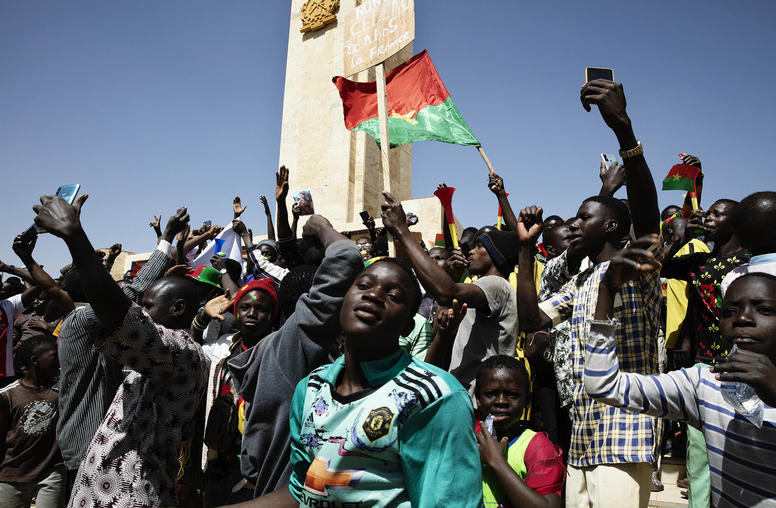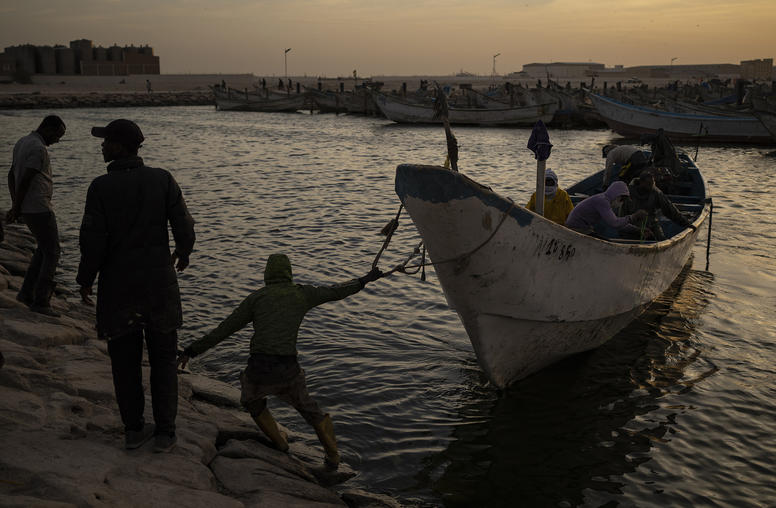Another Coup in the Sahel: Here’s a Way to Halt This Cycle
Burkina Faso shows a need for new policy—with ‘national dialogue’ at the center.
This month’s coup d’etat in Burkina Faso, the seventh in 26 months around the Sahel region, only extends the Sahel’s long agonies of failing governance, civil wars and violent extremism. Military-led intervention by France and other outside powers has failed to stem the widening destabilization of a landmass and population vastly bigger than those of the recent U.S. wars in Afghanistan or Iraq. U.S. and international security require a policy reset that addresses the Sahel crisis’ causes rather than its symptoms. In Burkina Faso and other states, this means supporting inclusive processes of national dialogue that can mobilize whole of the society to address those causes.

A Sahel Policy Reset
U.S. and international policymakers need to recognize the Sahel as a core of one of the world’s biggest security crises — a contiguous swath of countries destabilized not by some inexplicable predilection to violence but by a visible root cause: toxic governance. Generations of corrupt, authoritarian rule by elites rather than laws has prevented or undermined democracies, investments and the fulfillment of basic human needs. These failures of governance have bred violent extremism, communal conflicts and military coups or attempts in varied mixes among a half-dozen Sahel states — a zone of 138 million people that is nine times bigger and more than triple the population of either Afghanistan or Iraq.
International responses to the Sahel crises, led largely by France, the United States and United Nations, have focused primarily on armed counterterrorism such as France’s Operation Barkhane, an approach that has led to wider violence, human displacement and destabilization. The United States must take the initiative to convene realistic international responses to the Sahel crises, both at the regional level and in individual Sahel states. A more effective approach (a) will be led by credible, accountable institutions rooted in the region, and (b) will address the whole of society to begin meeting basic needs of people and communities in these violence-stricken states. A refocused U.S. initiative on the Sahel, based on these principles, should be a core message at the U.S.-Africa Leaders Summit in Washington in less than eight weeks.
A policy reset on the Sahel is vital to advancing the United States’ new strategy in Africa announced in August by Secretary of State Antony Blinken. This refocusing should include America’s regionwide effort, notably in revising its Trans-Sahara Counterterrorism Partnership to fit the region’s needs. In the states struggling to recover from coups — Sudan, Mali, Guinea, Chad and Burkina Faso — the transformation of governance from a franchise of corrupt elites toward an accountable, “whole-of-society” engagement requires some form of national dialogue.
National Dialogues, Regional Leadership
Many international policymakers now understand that stabilization in the Sahel means handing leadership and accountability to credible institutions in the region, first of all the 15-nation Economic Community of West African States (ECOWAS), and engaging neighboring states. Where army juntas have seized power, the United States and its partners should support ECOWAS in framing, advancing and monitoring the processes of transition to elected civilian governance.
Yet ensuring an accountable, region-led process is not enough. A reason that so many post-coup transitions have failed, leading only to more instability, is that they have lacked a mechanism to transform the nature of governance. What can launch such a task in countries steeped for years in corrupt rule by, and for, elites? Burkina Faso is an example, having been ruled for more than 50 of its 62 years by army generals who took and held power by force.
A way to begin transforming governance in such countries is what the peacebuilding field calls national dialogue. This works, step by step through consultations and public discussions at local, and then national, levels to seek the common ground among a country’s communities that can help them set their own sustainable and stabilizing vision for the country’s future. U.S. and international policies should use diplomatic, assistance and military channels to encourage such a dialogue in Burkina Faso and in other coup-damaged states.
It’s worth noting that a national dialogue is much different from the ad hoc meetings that many juntas convene after seizing power in a coup. These generally are designed not to seek a difficult national consensus, but rather to fabricate a sense of political legitimacy for a leadership that has taken power by force. Such politicized conferences, tilted to favor the post-coup power-elite, can undermine, rather than advance, prospects for the real dialogue that can advance stability. Burkina Faso’s new junta quickly convened a two-day meeting of about 300 delegates last week that approved a transitional charter naming the leader of the September 30 coup, army Captain Ibrahim Traoré, as the country’s new interim president. The charter prohibits Traoré from running for political office and he promised to maintain the previous coup leader’s agreement with ECOWAS to hand power to an elected civilian government by July 2024.
Making Dialogues Effective
Field experience and research, including a 2021 USIP study of six national dialogues (in Central African Republic, Kenya, Lebanon, Senegal, Tunisia and Yemen), highlight basic steps that can help national dialogues to stabilize countries against violent conflict:
- Full inclusion of the polity. National dialogues must encourage the participation of all communities, especially groups that have been excluded from political decision-making in the past. Often, that exclusion — whether of minority groups, political factions, youth, women or other constituencies — is a root cause of a country’s violent conflicts.
- Ground-level and nationwide preparation. The committee or other mechanism designated to convene a dialogue must consult communities and constituencies nationwide to understand people’s problems that improved governance must address. This task is complicated in a country like Burkina Faso where violence has spread widely — but Burkinabes held significant consultations of this kind before the country’s first coup this year, in January — and further consultation is possible. Any national dialogue must use the results of such consultations to frame the agenda for national dialogue sessions. The preparation phase should also lay out a clear plan for implementing the eventual decisions of the dialogue.
- Consensus-chosen leaders. The authority that convenes a national-level dialogue conference should not necessarily lead its deliberations. Instead, the participants in the room should select the leaders. In many conflict-stricken countries, these might include politically neutral figures such as community elders or religious or civil society leaders.
- Sustained communication with dissenters. In any conflict, hardline groups will likely refuse to join a dialogue, so a vital task is for representatives of the dialogue to maintain lines of communication with them. The consistent message to these non-participants must be that they can join the process at any time. Maintaining this communication helps prevent the radicalization that is always the product of exclusion.
Challenges in Burkina Faso
Might Burkina Faso’s new transition back to elected government include a transformation to more responsive and hence stable governance?
A first step would be to win support for a credible national dialogue from the interim authorities and a wide swath of society and public opinion — and an alliance of ECOWAS and other international partners would be important in achieving it. An immense task of trust-building would then follow among the 21 million Burkinabes who, over generations of coups, authoritarian regimes and frustrated pro-democracy movements, have lost faith in democracy’s ability to end corrupt, elite rule. That trust-building would require intensive work in neighborhoods and villages across a country where violent extremist groups control communities across broad swaths of the territory. And the trust-building would require leadership from figures still seen as “virtuous” and independent of established political forces. These might include some civil society, religious or traditional ethnic leaders.
Neither the United States nor the world can afford to underestimate the hazards — including famine, mass migrations and terrorist acts — created by the Sahel’s violence. While peace must rely on solid security institutions, military-focused interventions in Afghanistan, Iraq and the Sahel have proven insufficient. Indeed, a country like Burkina Faso, which has been ruled mainly by its military, demonstrates that “hard security” institutions cannot enforce peace or stability in the absence of governance that is responsive and accountable to its people. To advance that governance where it has failed, national dialogues, led by a country’s own people, are a realistic, effective tool.
Sandrine Nama is a USIP country officer for Burkina Faso.



